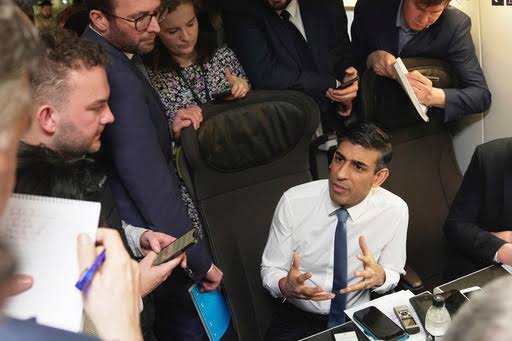Rishi Sunak urged NATO allies to show ‘demonstrable progress’ on Ukraine joining the coalition as world leaders gathered for a summit in Lithuania.
The Prime Minister called on coalition chiefs to show Kyiv’s bid had moved forward since the organisation first agreed in principle in Bucharest in 2008 that Ukraine could one day join the alliance.

Speaking as he flew to Lithuanian capital Vilnius, he told reporters: ‘We’ve always said Ukraine’s rightful place is in NATO.
‘We stand by the language of 2008 Bucharest and I think what’s important at this summit is that commitment is reaffirmed but also there is demonstrable progress towards that goal – and I think that’s what you will see.’
However, under NATO rules Ukraine will not be able to join until the war with Russia is over. Until then, Britain and some other allies want to offer Kyiv ‘security assurances’.
Mr Sunak said: ‘The purpose of these are to demonstrate multilateral support for Ukraine but also enduring and long term support for Ukraine.
‘I think that is critical because it’s the right thing to do, but also because it will send a strong deterrent message to the Russians – that’s why I’ve been very keen to try and get this over the line.’
The PM said such a move would ‘send a very strong signal of deterrence to (Vladimir) Putin – that he can’t wait people out in terms of this conflict’.
Mr Sunak called on NATO nations to pump more cash into the military alliance, which sets members a target of spending at least 2% of GDP on their armed forces.
But latest NATO figures show the percentage spent by Britain is due to drop from 2.16% in 2022 to 2.07% in 2023.
Challenged by the Mirror, he claimed the alliance’s figures – published last Friday – were ‘out of date’ and did not take account of an extra £5billion announced at the Budget in March.
‘NATO collects defence expenditure data from Allies on a regular basis and presents aggregates and subsets of this information.
‘Each ally’s Ministry of Defence reports current and estimated future defence expenditure according to an agreed definition of defence expenditure.
‘The amounts represent payments by a national government actually made, or to be made, during the course of the fiscal year to meet the needs of its armed forces, those of allies or of the alliance.
Asked about the fall in the percentage of GDP the UK is allocating to defence, Mr Sunak said: ‘Those figures are out of date.
‘When they compiled the numbers for that table you’re seeing, what they didn’t have was the uplift in defence spending.
‘It doesn’t include, for example, the £5bn that was announced at Spring Budget which is strengthening the nuclear enterprise and rebuilding stockpiles.
‘If you put that into account, defence spending would be increasing as it is in our own figures, and we will continue to be the largest spender in Europe and the second largest in NATO.
‘Mr Sunak said they failed to take account of a £5billion boost for the Royal Navy’s Trident-armed nuclear submarine fleet and to replenish stocks of weapons sent to Ukraine.’

